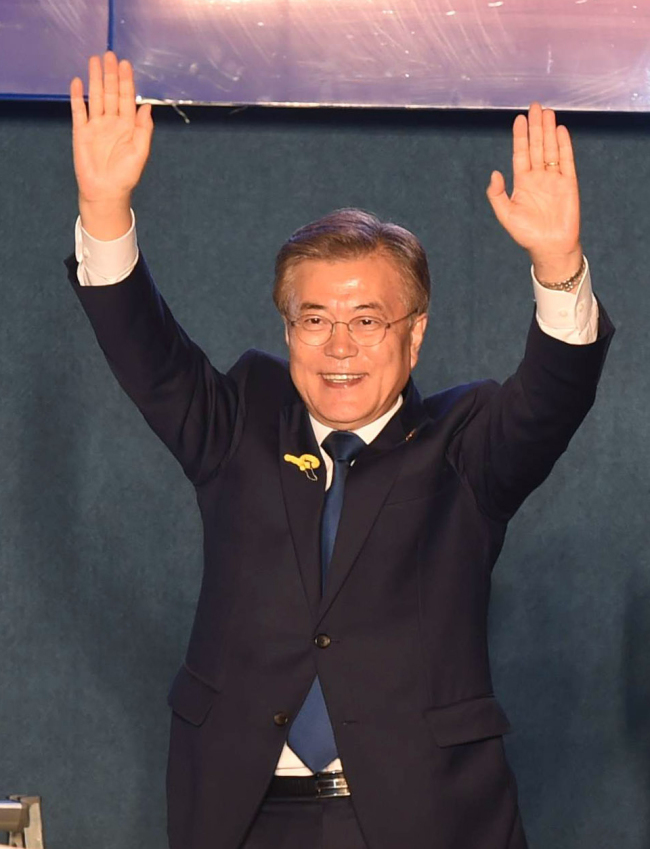Moon Jae-in, a human rights lawyer turned liberal politician, was elected president in a landslide victory on Tuesday, May 9.
Moon won the election with 41.1 percent for the voters. Moon will be sworn in at the National Assembly at noon Wednesday.
 |
| Liberal candidate Moon Jae-in reacts to supporters in Gwanghwamun, central Seoul, as he emerged as a clear winner in the presidential election on Tuesday night. (Park Hyun-koo/The Korea Herald) |
“It is a great victory of the great people who gave their support to create a just country, a united country, a country worth the name, where principles and common sense are upheld,” Moon said, speaking to thousands of supporters who gathered in central Seoul after his victory was confirmed.
Conveying his thanks and condolences to his rivals in the presidential race, Moon went on to say that he will work with them, and that he will become a “president of unity” who serves every Korean.
“I will give everything I have to create a new country. I will take the right way, with eyes only for the people.”
Moon was joined by Democratic Party chief Rep. Choo Mi-ae, Seoul Mayor Park Won-soon as well as his rivals in the party primaries who called for continued support for the new leader.
Moon’s win marks the return of a liberal administration after nearly 10 years of conservative governments and seven months of political turmoil set off by a scandal involving former President Park Geun-hye.
Drastically different from the two conservative presidents, Moon is likely to bring a seismic shift in South Korea’s policies over the next five years — ranging from North Korea and the economy to education and welfare.
Having vowed to carry on the legacies of two previous liberal presidents who favored reconciliation over confrontation with the communist North, Moon is widely expected to attempt to improve inter-Korean relations, which have deteriorated during consecutive conservative governments.
Following the release of the exit poll figures, Moon said that he would “launch the third Democratic (Party) administration and achieve reform and (social) integration — the two goals the people yearn for.”
Both conservative Hong Joon-pyo of the Liberty Korea Party, and People’s Party’s Ahn Cheol-soo conceded defeat in public speeches around 11 p.m.
Exit polls conducted jointly by the three terrestrial broadcasters — KBS, MBC and SBS — projected that Hong and Ahn would get 23.3 percent and 21.8 percent, respectively. Early counts placed Hong at about 26 percent, and Ahn at just under 22 percent.
Ballot counting was expected to be completed around 6-7 a.m. Wednesday.
In admitting defeat, Hong said that he would settle for “reviving the Liberty Korea Party,” to shouts of “do not concede” from the gathered crowd. As for Ahn, he said that he accepted the will of the people, and that he would continue to work for change, and for the future of the country.
Tuesday’s election resulted from the impeachment of President Park in March. Voting had lasted for 14 hours from 6 a.m. to 8 p.m. Turnout was estimated at 77.2 percent, the highest in nearly two decades.
According to exit polls and early counts, Moon was the popular choice in nearly all regions, with the exception of two conservative strongholds: Daegu and the North and South Gyeongsang provinces.
By age group, Moon held sway among voters under the age of 60. He was the most popular among exit poll respondents in their 30s, with 56.9 percent saying they had voted for the Democratic Party candidate. In contrast, Hong was the most popular choice for voters aged 60 and over.
Moon, 64, entered the political arena as an aide to former liberal President Roh Moo-hyun and rose to prominence as the successor to the late Roh, who took his life a year into a bribery investigation, which some saw as being politically tinged.
Roh and his preceding liberal President Kim Dae-jung were marked by their North Korean policies that aimed to facilitate inter-Korean cooperation and dialogue. Kim and Roh are also the only South Korean presidents to hold summit talks with their North Korean counterpart Kim Jong-il.
Moon’s North Korea-related plans revealed so far include reopening and expanding the Kaesong Industrial Complex that was shut down by the Park administration following Pyongyang’s fourth nuclear test in January 2016. Moon has also stated that he will renegotiate issues surrounding the deployment of THAAD missile defense system with the US, and subject the matter to ratification by the National Assembly.

